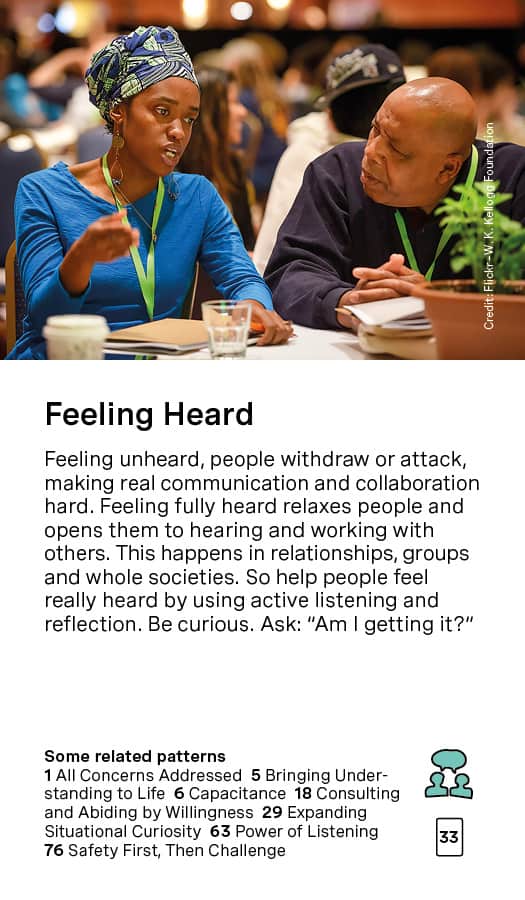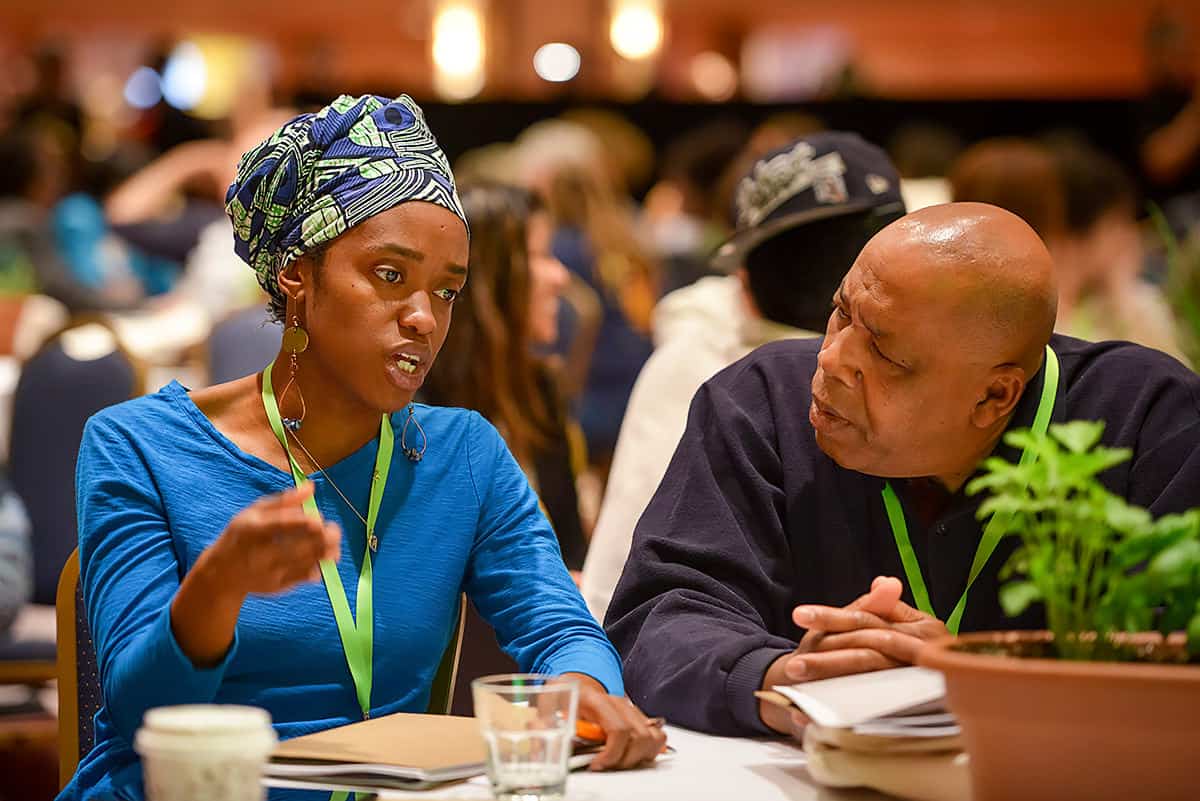Pattern #33
Pattern Card
Click to enlarge or download Pattern Card.
Buy or Download
To buy or download the complete Wise Democracy Card Deck use the Buy & Download button.
Comments
We invite your participation in evolving this pattern language with us. Use the comment section at the bottom of this page to comment on its contents or to share related ideas and resources.
Feeling Heard
Credit: Flickr – CC 2.0 – W. K. Kellogg Foundation – Harvesting Change
Pattern Heart
Feeling unheard, people withdraw or attack, making real communication and collaboration hard. Feeling fully heard relaxes people and opens them to hearing and working with others. This happens in relationships, groups and whole societies. So help people feel really heard by using active listening and reflection. Be curious. Ask: “Am I getting it?”
Some related patterns: 1 All Concerns Addressed 5 Bringing Understanding to Life 6 Capacitance 18 Consulting and Abiding by Willingness 29 Expanding Situational Curiosity 63 Power of Listening
76 Safety First, Then Challenge
Feeling Heard – going deeper …
This is an edited version of the video on this page.
This pattern comes out of my understanding of a number of processes that are particularly potent, in which the main active person in the process – whether the facilitator or a person taking initiative in the communication – is trying to truly and deeply understand whoever is speaking. They kind of climb into that person’s universe, try to articulate what they think and feel, and explicitly check if they are really getting it. They really want to know; they aren’t just going through the motions. They reflect the essence of the speaker’s emotions as well as their content, perhaps saying something like “You really do hate your boss, don’t you?!“ – with all the emphasis of the speaker’s passion. After all, you don’t have to agree with somebody in order to reflect back the essence of what they are really feeling and thinking.
This experience of being truly and deeply heard is so rare. There is this funny kind of shift that happens in people when they really feel heard. They can kind of let go of the thing they were trying so hard to push out into the world. And there is a relaxing and opening – often with a sigh of relief. And if this is done really well with somebody, even if they are very adverserial or ideological, they will loosen up. If this is done in a whole group, they will all open up and be able to hear each other more. When that happens there is a more ready flow of information, of perspectives, emotions, insights, all the things you need in order to come to a wise decision, they are all finally there in that space. It isn’t a bunch of solid minds and hearts bouncing off of each other.
It is great for relationships when that happens, and even in the whole of society. When you look at what is going on in the larger society, you experience people in an argumentative state because the system is set up for everyone to fight and try to get their way. Hardly anything can happen and when something does happen, it is because somebody has won and somebody has lost. Then those lost people continue fighting to get heard and get their way as soon as they can.
Video Introduction (6 min)
Examples and Resources
- Dynamic Facilitation
Link-CII
Link - Nonviolent Communication
Link-CII
Link - “The importance of being heard”
Link-Gwen
Link-Dralicechan
Link-Theemotionmachine - What makes people feel heard
- Center for Building a Culture of Empathy Link
- The power of feeling seen and heard
- The gift of being seen and heard
- Silence and Powerlessness go hand in hand
- Story Bridge Link
- Clean Language Link
- Watch high quality transpartisan dialogue in action
- How to Star Man: Arguing from compassion




When Someone Deeply Listens to You
When someone deeply listens to you
it is like holding out a dented cup
youve had since childhood
and watching it fill up with
cold, fresh water.
When it balances on top of the brim,
you are understood.
When it overflows and touches your skin,
You are loved.
When someone deeply listens to you,
the room where you stay
starts a new life
and the place where you wrote
your first poem
begins to glow in your minds eye.
It is as if gold has been discovered!
When someone deeply listens to you,
your bare feet are on the earth
and a beloved land that seemed distant
is now at home within you.
by John Fox in Finding What You Didnt Lose
FEELING HEARD
If we really
GET each other,
we can relax, listen & create together
What does it feel like inside when someone really hears you – and when they clearly don’t?
What can we do to help people feel really heard?
How would people feeling really heard change our conversations, relationships, societies…?
Here’s what I heard…. Have I missed something important?
Lorna, I can relate to your questions that explore your own emotional reactions and responsibility to hearing and feeling heard. I have learned that I am not the greatest of listeners sometimes and have committed to improving that skill over the last few years. I’ve also been trying to be more honest and forthright with others when I feel I am not being heard. Sometimes just outright saying to the other person, “It’s important to me to feel heard by you,” can take the conversation to new, more open level. I also appreciate Tom reminding us of the importance of reflecttion on this as an individual and then extending that idea to a group or community.
When I was doing leadership training, we addressed active listening and how to help a person feel heard. This involved making “I” statements, restating/paraphrasing a person’s message back to them, checking for understanding, not making assumptions, seeking first to understand. It can be extremely powerful when a group learns to interact in this way on a regular basis. As Tom mentions in the video, it does bring in new perspectives, lowers resistance, and makes people feel more at ease.
When you can make a group feel that they are heard, collectively and individually, you are giving them nothing less than a beautiful gift.
‘Oddly enough feeling heard is different from listening.’
As I ponder this statement the following questions come up for me…not looking for answers, just letting these questions breathe.
What responsibility do we have when we don’t feel heard?
And how might we communicate more skilfully so we are more likely to be understood?
And how do we take care of the feelings that arise when our need to be understood is not met?
And what role does forgiveness play in terms of moving forward?
Great questions from an individual’s perspective, Lorna. They add another dimension to my original perspective when I created this pattern. I had in mind practices like Nonviolent Communication and Dynamic Facilitation (see the Examples and Resources list) where a practitioner is actively helping others to feel heard. You are pointing out that we can individually do things to help ourselves be heard.
There is also a subtle difference between “being heard” and “feeling heard”. To the extent we have to work to BE heard, we may not in the end really FEEL heard. I hadn’t considered this nuance of how much the attitude and attention of the hearer impacts the experience/feelings of the speaker, semi-independently of how well the content of their communication gets across.
Powerful questions to sit with and let breathe! Thank you for sharing.
Hi, Susan. I read your comments the other day, and have been thinking about your concluding quesitons. ‘Just imagine a world where every person, every group, community, country felt deeply heard? Where would this lead us?’ Where, indeed.
For me, the only path to such a place (person; group; community; etc.) is through explicit learning of listening (see card 63). Exploring the relationship (in ourselves, as a start) between listening to others and being heard ourselves is most interesting.
I seem to remember a set of ideas from the 1970s by a man named Tom Gordon in ‘Parent Effectiveness Training (PET)’ that included barriers/inhibitors to listening. Hearing (in the sense intended here, not the physical sense of hearing through our ears solely) requires attentive listening.
One of my favourite novels is ‘The Fifth Sacred Thing’ by Starhawk. I feel, in that novel, she portrays being heard (within both personal and community settings) quite nicely. Oh, then the characters explore the outer, wider, world…
Great opening, Susan.
brian
To me feeling heard is such a foundational characteristic of any process, interaction, initiative so for me it becomes the basis of all the patterns. If and when you feel heard is so gratifying. I find it a major striving in my life because it can be such a transformational experience when done well. As Tom explained this can be experienced individually or in a group or in a community or globally. It carries such potential for change. Just imagine a world where every person, every group, community, country felt deeply heard? Where would this lead us?